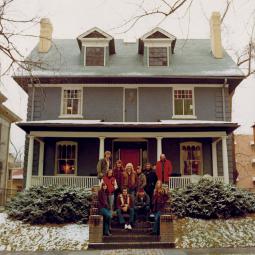In the 1970s, about a century after the Colorado Gold Rush, Denver’s music scene attracted a different influx of bearded hopefuls with twinkles in their eyes.
Some came to make music; some came to hear it. Los Angeles record executive Larry Ray and producer Bill Syzmczyk came to mine it.
In 1971, the duo founded Denver’s Tumbleweed Records, a label focused on cultivating the area’s untapped talent.
Like the musicians it attracted, Tumbleweed has remained obscure since it shuttered overnight in 1973. But thanks to a reissue project by Light in the Attic Records, an Seattle-based independent label that specializes in reissuing hidden gems, Tumbleweed’s music is getting a second look.
On May 12, Light in the Attic will release “Sing It High, Sing It Low: Tumbleweed Records 1971-1973,” a 10-song compilation of Tumbleweed’s 3-year, 9-album labor of love. The music ranges from the funk-rock of Dewey Terry to acts such as Pete McCabe and Arthur Gee, folk tributaries who fed the genre down-river from Graham Nash and Buffalo Springfield.
For as memorable as the music is — Danny Hoilen’s “Colorado” is a swelling tribute to the state’s majesty that sounds like a University of Colorado sit-in going up in smoke — the label’s origin story is just as important to Light in the Attic Records, which includes a rundown of Tumbleweed Records’ rise and fall in the album’s liner notes.
What’s most striking is how unlikely the tale seems today. This was a time when labels could actually make money from selling records — and spent risky amounts getting ahead of music trends.
That’s how Syzmczyk and Ray got Tumbleweed funded to the tune of $5 million. In one 6-hour meeting, the duo persuaded American business conglomerate Gulf + Western (not to be confused with oil company Gulf Western) to bankroll their Denver operation, which they saw as capitalizing on the new-ish wave of psychedelic rock.
It wasn’t a total gamble. Syzmczyk and Ray, who were 28 and 31 at the time, respectively, had already established themselves in the music industry. Colorado-born Ray persuaded Atlantic to pick up the sole album by former CU student Judy Roderick’s short-lived project 60,000,000 Buffalo. Syzmczyk produced that album, and a couple of other notable projects, including B.B. King’s “The Thrill Is Gone.” He is also responsible for signing the James Gang, which featured future Eagles guitarist Joe Walsh.
With funding secured, they hired an illustrator and a couple of assistants, and set up shop at 1368 Gilpin St., a two-story brick house near Cheesman Park that would serve as the label’s office and meeting point for its stable of far-out artists.
Syzmczyk, who today still produces works by Tumbleweed Records singer-songwriter Michael Stanley, deferred to the artist when asked to describe the digs.
“Here’s the quote that best describes the whole thing,” Syzmczyk, now 74, said, in paraphrasing Stanley: ” ‘Five guys smoking pot and making records — what’s not to like?’ ”
Choosing Denver as its headquarters wasn’t an accident. After the folk boom of the early ’60s, Denver had established itself as a haven for the genre. The city saw Judy Collins’ career blossom and taught Bob Dylan how to use a harmonica holder — and subsequently chased him away for stealing records — all before Harry Tuft would found its crown jewel Folklore Center in 1964.
The label was a godsend for the city’s niche folk troubadours who, after chasing their eggs-in-moonshine dreams out to Denver, may have otherwise gone unsigned. (Syzmczyk said this was part of the allure of Denver: “There was a pool of talent there, and there was no way for them to get out.”)
For Arthur Gee, whose self-titled album was released on Tumbleweed in 1971, it was a right-time, right-place proposition. His album came about after the son of a Texas oil tycoon saw him play at a bar on East Colfax Avenue — and gave him $25,000 to record it.
“It was just like somebody dropped out of the sky,” Gee, now 73, said.
That someone never released the album, but Tumbleweed did, remastering “Arthur Gee” as its debut record.
Singer-songwriter Pete McCabe, referred to in Light in the Attic’s liner notes to as “the oddest songwriter in the world,” was discovered at a nascent Denver Folklore Center by Tumbleweed talent scout (and later-artist) Robb Kunkel. McCabe had been making the rounds at Denver cafés like the Green Spider, taking turns on a stage graced by Judy Collins and a number of Bob Dylan impersonators.
Barely 20 at the time, McCabe was suddenly being spirited to cities like L.A. and New York, where he recorded with lauded session players at the legendary Hit Factory. Tumbleweed released his debut “The Man Who Ate the Plant” in 1973.
That year would also be Tumbleweed’s last. For all the money Syzmczyk and Ray received from Gulf + Western, they had no distribution and promotional support. (They took the latter into their own hands, swinging by local radio stations to drop off an ounce of weed and an album on DJs’ desks — an effort Syzmczyk called “green payola.”) Financial disputes fractured Ray’s relationship with Gulf + Western, and Tumbleweed Records dissolved essentially overnight.
Gee was in Texas for a short tour with seminal psych band the 13th Floor Elevators at the time. When he came back to the house at Gilpin Street, Tumbleweed was already gone.
“Everyone was there because we were being paid,” Gee said of Tumbleweed’s Denver musicians. “We ended up in the middle of nowhere.”
Decades later, Gee and McCabe are still recording music. Both are hoping the Light in the Attic release spurs an interest in their music, old and new. For Gee, that’s a concept album called “Stressed to the Max in Paradise,” which he hopes will help cement his modest artistic legacy. At 68, McCabe just released “I Forgot,” an album loosely themed around technology. Yes, he’s still weird: The sleeve shows him looking suspiciously from his iPhone while the Earth sprouts a giant tree behind his back.
Syzmczyk left Tumbleweed and Denver behind in the early ’70s, but he’s coming back in August to induct Walsh’s band Barnstorm into the Colorado Music Hall of Fame. The city has changed considerably since then: Zillow pegs 1368 Gilpin St. as a roughly $6,000-per-month rental property.
That figure shocked Syzmczyk. But, as he conceded, “I just produced records — I didn’t pay the bills.”




